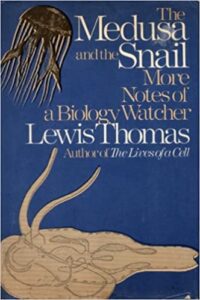Since my last post, I’ve been thinking a lot about words. These thoughts led me back to the marvelous essays of Lewis Thomas. Thomas was a brilliant and witty scientist, a keen observer, and a great thinker. I love this man’s brain. My own brain is far from scientific, so what I admire about Thomas is his great ability to speak to people like me — to present complex concepts in ways that are not simply accessible, but beautiful. Thomas’s writing suggests he spent a great deal of time pondering the symbiotic relationship between man and nature. He discussed everything from medicine, germs, animals, warts, cloning and the atomic bomb to poetry, language, punctuation and Mahler’s Ninth Symphony. Although the bulk of Dr. Thomas’s work was published in the 1970s and 80s, I believe it holds relevancy today. In fact, it is remarkable to consider his ideas in the context of today’s world.
Thomas’s essays in The Medusa and the Snail: More Notes of a Biology Watcher (1979), come to mind as I ponder words and how we put them together as writers and thinkers. I find comfort and intrigue in his thoughts on mistakes and “error.”
Thomas explains that “an etymon is supposed to be a pure ore of a word . . . absolutely original, signifying just what it was always intended to signify. They are rare these days. . . . Most of the words we use are hybrids . . . reconditioned words.” He sees the creation of these reconditioned words as a “series of accidents,” saying, “It may be that the evolution of language was largely a matter of luck . . . the result of an interminable series of blunders . . . words are simply let loose by all of us, allowed to fly around out there in the dark, bumping into each other, mating in crazy ways, producing wild, random hybrids, beyond the control of reason.”
“Mistakes,” Thomas says, “are at the very base of human thought, embedded there. . . . We are built to make mistakes, coded for error. We learn, as we say, by ‘trial and error.’ Why do we always say that? Why not ‘trial and rightness’ or ‘trial and triumph’? He says, “Biology needs a better word than ‘error’ for the driving force in evolution. Or maybe “error” will do after all, when you remember that it came from the old root meaning to wander about, looking for something.”
As a writer striving to be a ‘Queen of Words,’ I spend a lot of time “wandering about, looking for something” . . . the right words. Thomas’s idea of words being “let loose . . . to fly around in the dark, bumping into each other, mating in crazy ways” makes me want to run to my keyboard with the hope of entering, once again, that special state of mind “beyond the control of reason.”
An exciting place to be.
Other books by Lewis Thomas:
The Lives of a Cell: Notes of a Biology Watcher (National Book Award, 1974)
The Youngest Science: Notes of a Medicine-Watcher (1983)
Late Night Thoughts on Listening to Mahler’s Ninth Symphony (1983)
Et Cetera, Et Cetera: Notes of a Word-Watcher (1990)
The Fragile Species (1992)

